Find Your Perfect School
We live in the Information Age where data and information are key—and people who know how to handle it are highly sought after! For this reason, a master’s degree in mathematics can be an advantage in the job market.
Forbes magazine ranked statistics as among the best master’s degrees for jobs. The Bureau of Labor Statistics (BLS) also discloses that a master’s degree is a must for most job opportunities for mathematicians and statisticians, and these jobs are in the public and private sectors.
Studying mathematics at the master’s level can offer students diverse academic opportunities to specialize in mathematics-based subjects. Those who pursue a master’s degree in mathematics have the potential to develop the advanced subject knowledge they need to thrive in the competitive mathematical field. Master’s programs offer specialized training in mathematics that focuses on the development of analytical, computational, and research-based problem-solving skills.
Mathematicians with a master’s degree are most likely to find jobs in finance and insurance, scientific research and development, social assistance and management, business management, education, and healthcare industries, as well as in scientific and technical consulting.
These jobs require the advanced knowledge and skills learned in a master’s degree in mathematics program, including:
- The ability to gather, interpret and manipulate large data sets in solving specific issues, whether in business management or education;
- The professional understanding of complex numerical concepts;
- The ability to use research tools and techniques in getting relevant information from raw data; and
- The soft skills including communication, time management, and team skills
Indeed, a master’s degree isn’t just about the math-related knowledge and skills learned but the personal skills developed in its pursuit!
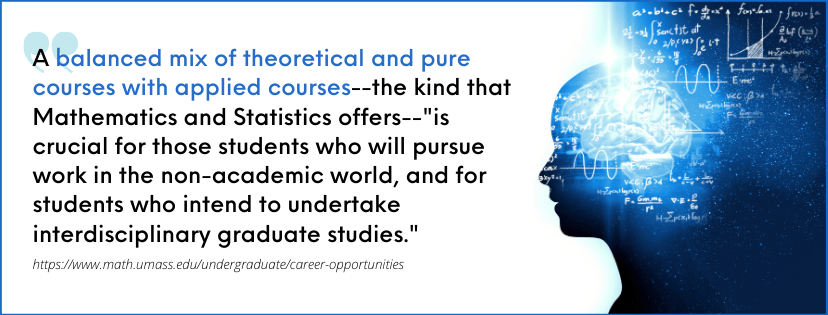
Methodology
In putting together our list of the Best Online Master’s in Mathematics Programs, our researchers at PremiumSchools.org considered the programs’ overall structure and student-friendliness. We determined that each of the schools on our list:
- Delivers 100% or hybrid instruction that promotes self-paced online learning to Online Master’s in Mathematics students who seek academic fulfillment without compromising work, family, and studies. Most programs in the list offer asynchronous delivery.
- Offer the choice of part-time and full-time enrollment and rolling admissions and multiple admission dates, as applicable, to allow students to earn their master’s degree at their own pace,
- Delivers top-quality of Online Master’s in Mathematics instruction by a credentialed faculty who have carved a name for themselves in the industry mainly through published work,
- High university and Online Master’s in Mathematics program reputation,
- Offer financial aid in scholarships, grants, and assistantships, even reasonable payment plans to students in need.
- Accredited by these agencies:
- Higher Learning Commission (HLC)
- Southern Association of Colleges & Schools Commission on Colleges (SACSCOC)
- New England Commission of Higher Education (NECHE)
- National Council for Accreditation of Teacher Education or NCATE
- Western Association of Schools and Colleges Senior College and University Commission (WSCUC)
- Middle States Commission on Higher Education (MSCHE)
For more information on our selection process, please visit our Methodology page.
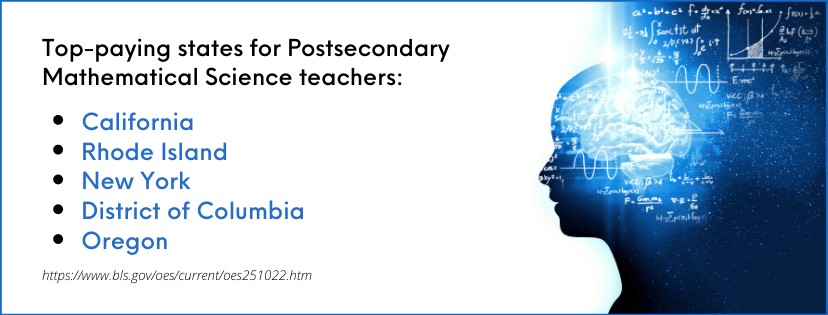
The 14 Best Online Master’s in Mathematics Programs
Emporia State University
MS in Mathematics
School Standouts:
ESU’s MS in Mathematics program is a non-thesis program that allows its students to be enrolled part-time or full-time depending on their unique circumstances. But the university requires completion in three years, and students must pass multiple comprehensive exams. The courses include categorical data analysis, technology in mathematics, and numerical linear algebra, which will provide the students with advanced mathematical skills.
Graduates find viable employment in a wide range of settings, from teaching positions in high schools and community colleges to supervisory positions in business and industry. Many more also pursue higher studies in another institution. Indeed, this is an excellent program that will boost not only your academic credentials but also your job opportunities!
Applicants preferably should have a strong mathematics background – 24 credits hours in undergraduate math are recommended. Undergraduate experience in calculus sequence and mathematical proofs are also preferred.
The program’s completion target date is less than three years, but it depends on several factors, including the number of courses taken in a semester.
Campus Location: Emporia, Kansas
Accreditation: HLC
Graduation Requirements:
Students must earn 34 credit hours and either pass comprehensive exams or submit an approved thesis before graduation.
LEARN MORE ABOUT ESU’s MS in Mathematics program.
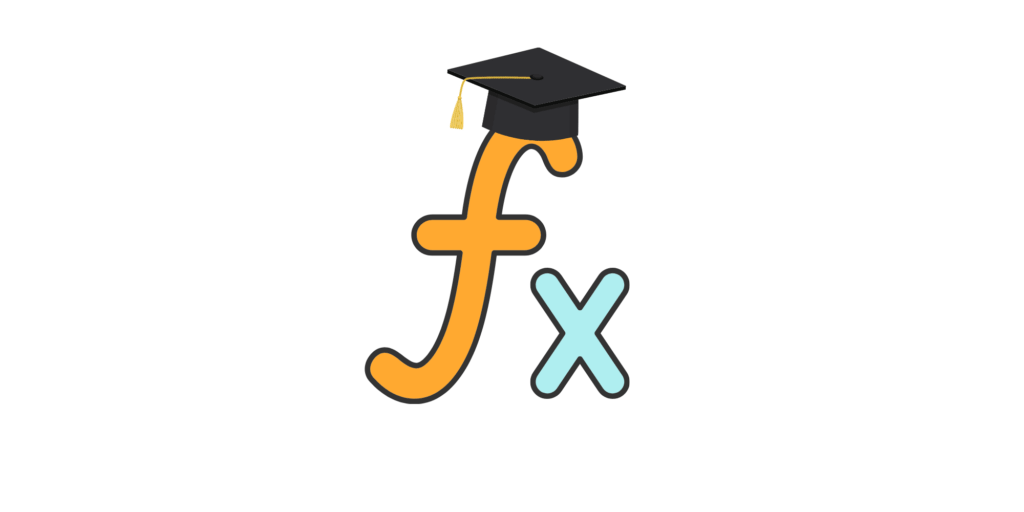
Ball State University
Masters in Math
School Standouts:
Ball State’s MMath programs’ online courses are taught by the same credentialed on-campus professors, an assurance that the degrees conferred are world-class in quality. Students choose from three concentrations in MA in math education:
- For elementary and middle school teachers, a 30-credit program offered to teachers with at least one year of teaching experience
- For high school teachers, a 30-credit to 32-credit program for applicants with a bachelor’s degree in math or related discipline, possess at least one year of high school math teaching experience, and with a math teaching license
- For elementary and middle school specialists, a 36-credit program for teachers with a math teaching license and three years of teaching experience
Students learn the areas that the National Council of Teachers of Mathematics has identified as crucial for teacher success. If the course program is followed, you may earn the degree within two to three years. You may also take summer classes to fast-track your progress.
The program is available in two formats. First, the asynchronous format allows students to work on their weekly assignments at their own pace. Second, the fixed-time format where students participate in synchronous activities.
Financial aid is available through the Office of Financial Aid and Scholarships, including federal aid, scholarships, and grants. Check for your eligibility for employer assistance, senior citizen aid, and state assistance (up to 50% cost reduction in tuition).
Campus Location: Muncie, Indiana
Accreditation: HLC
Graduation Requirements:
Students must meet the credit requirement, which varies depending on the concentration chosen.
LEARN MORE ABOUT Ball’s MMath programs.

University of Missouri
Master of Education in Learning, Teaching, and Curriculum with an Emphasis in Mathematics Education
School Standouts:
Mizzou’s Master of Education in Learning, Teaching and Curriculum with an Emphasis in Mathematics Education is offered in its College of Education to help students build their teaching expertise. Certified teachers who want to improve their teaching competence and fulfill their continuing education requirements, perhaps improve their opportunities for leadership positions.
This is a 100% online program to study at their own pace, save on travel costs and enjoy a better work-life balance. But students can also enroll in on-campus electives with face-to-face meetings if they so desire.
Contemporary Equity Issues in Education, Problems in Curriculum and Instruction, Technology and Mathematics Education, and Secondary Mathematics from an Advanced Perspective are among the core courses. Electives include Human Learning, Technology to Enhance Learning, and Curriculum Leadership. With one to two courses taken per semester, a typical student can finish the program within two years.
Keep in mind that Mizzou has a highly selective admissions process. Applicants preferably must be certified math instructors with two years of relevant teaching experience, a bachelor’s degree, and at least a 3.0 GPA in an undergraduate program. Application requirements include official transcripts, résumé, personal statement of purpose, and two letters of recommendation.
Mizzou has a rolling admissions policy. Deadlines for application are June 15 (fall term), October 15 (spring term), and March 15 (summer term).
Financial aid is available from the nationally-recognized public university.
Campus Location: Columbia, Missouri
Accreditation: HLC
Graduation Requirements:
Earning the MEd degree requires completion of 30 credit hours, of which at least 16 credit hours are at the 8000 levels.
LEARN MORE ABOUT Mizzou’s MEd: Mathematics Education program.

North Carolina State University – Raleigh
Mathematics – Secondary Education Master of Arts in Teaching (MAT)
School Standouts:
The Mathematics – Secondary Education Master of Arts in Teaching (MAT) program at NCSU is among the few accelerated teacher licensure programs in the US. Take note that it’s a dual program in that graduates earn a master’s degree and an initial teaching license in less than two years if enrolled on a full-time basis. While it has its benefits, it has its limits, too, such as the fact that it’s neither designed for advanced credentialing purposes nor as a prerequisite for entry into a research-heavy Ph.D. in education programs.
But for individuals who strive for professional growth through more effective teaching strategies in the modern classroom, it’s an awesome program! Students learn tools and techniques in becoming effective teachers in K-12 levels through technology, including computer-based and mobile software.
Applicants must have either 24 hours of maths for secondary school or 18 hours of math for middle school to be considered for admission and an “A” license. Deficiencies in undergraduate work can be filled alongside online coursework, including calculus, linear and advanced algebra, and statistics.
Application deadlines are on April 1, 2021, for the summer term, June 1 for the fall semester, and December 1 for the spring term.
Campus Location: Raleigh, North Carolina
Accreditation: SACSCOC
Graduation Requirements:
Completion of 33 credit hours is a must for graduation.
LEARN MORE ABOUT NCSU’s Secondary Education (MAT) program.

Kansas State University
Master’s in Curriculum and Instruction with a Mathematics Education Concentration
School Standouts:
Teachers with a keen interest in advancing their teaching knowledge and skills and earning professional credentials will find K-State’s Master’s in Curriculum and Instruction with a Mathematics Education Concentration useful. The program emphasizes contemporary theory, practice, and education research, particularly in K-12 math.
Students must complete the three credits requirements in each of these core areas: teaching and learning, curriculum, educational technology, diversity, research, and scholarship. Plus, they have to comply with at least 15 credits requirements in their chosen specialization and Master’s Project. Other requirements include either a master’s thesis or a master’s report.
K-State requires all applicants to meet the general university admission requirements before being considered for admission. Other documentation required includes a statement of objectives, resume, unofficial transcripts, and names and emails of three academic and professional references.
Scholarship opportunities are offered to qualified students based on academic merit, financial aid, and military status, but students who don’t qualify can ask about financial aid.
Campus Location: Manhattan, Kansas
Accreditation: HLC
Graduation Requirements:
The program requires the completion of 31 credit hours for graduation.
LEARN MORE ABOUT K-State’s Master’s Degree with a Mathematics Education Concentration program.
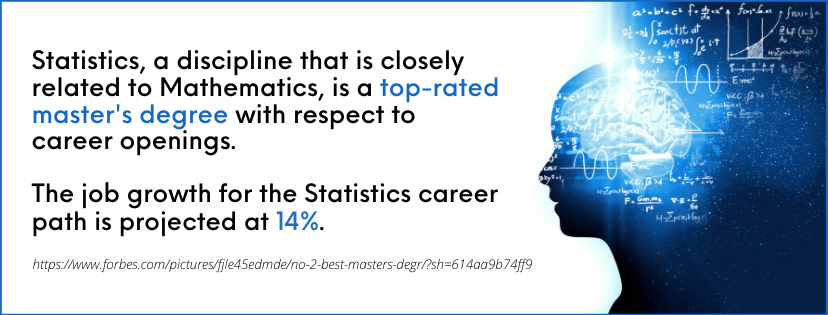
University of Texas – Arlington
Master of Education in Curriculum and Instruction – Mathematics Education
School Standouts:
Students in the Master of Education in Curriculum and Instruction – Mathematics Education program benefit from its non-thesis nature, but it doesn’t make the rigorous coursework any easier. This program attracts experienced teachers with an eye toward specialization in math education through an advanced graduate curriculum. Students are provided with opportunities to become trusted experts in math instruction and leaders in the education industry.
Graduates are known for their self-awareness in analyzing their effectiveness as teachers and making the appropriate adjustments, which will benefit their students and schools. Their deeper understanding of the state of education makes them valuable partners in developing the teaching profession.
Take note that earning a master’s degree doesn’t result in initial teacher certification. But it’s an excellent stepping stone toward better job opportunities at the K-12 level! Students learn teaching strategies for math subjects, including scientific reasoning and other alternative educational settings.
Applicants with and without a math background are welcome to apply, but they must possess a bachelor’s degree from a regionally accredited institution. The application deadline is on April 29, 2021, with classes starting on May 24, 2021, and application requirements include a completed online application, two letters of recommendation, and official transcripts. Students can graduate in as little as 18 months.
Campus Location: Detroit, Michigan
Accreditation: NCATE
Graduation Requirements:
Students must complete 30 credit hours.
LEARN MORE ABOUT UT Arlington’s M.Ed. in C&I – Mathematics Education program.

Faulkner University
Master of Education in Curriculum and Instruction with a concentration in Secondary 6-12 Mathematics Pedagogy
School Standouts:
Faulkner University offers a Master of Education in Curriculum and Instruction with a concentration in Secondary 6-12 Mathematics Pedagogy, an online program suitable for professional growth teachers. Students benefit from the combination of intensive online learning and field experiences designed to boost their teaching expertise.
The core curriculum includes courses in ethics for educators, advanced educational psychology, learning technology, curriculum design, and instructional methods. The program is designed to complete one course at a time which allows students to be fully immersed in the subject and, thus, learn more.
Applicants must have a bachelor’s degree and present application requirements, including a 250-word personal statement and three letters of recommendation with specific comments about academic performance. A completed online application plus official transcripts and a signed acknowledgment form are also required.
MAT or GRE scores may be required for certain applicants, too. But the presentation of these documents isn’t a guarantee for admission into the competitive program since the admissions panel will also consider other crucial factors.
Campus Location: Montgomery, Alabama
Accreditation: SACSCOC
Graduation Requirements:
The program includes ten three-hour courses lasting for five weeks each or a total of 30 credit hours. Besides online academic coursework, students must also participate in a week-long orientation before rendering community-based, service-oriented field hours.
LEARN MORE ABOUT MEd in C&I: Secondary 6-12 Mathematics Pedagogy program.

James Madison University
MEd in Mathematics
School Standouts:
The MEd in Mathematics program at JMU is targeted at high school teachers whose professional goals include getting instructional leadership positions. Students improve their professional teaching competence through a combination of mathematics teaching and learning and in-depth math studies. The completely online program also allows them to maintain a healthy work-studies balance.
This program is a collaborative partnership between the Department of Mathematics and Statistics and the College of Education. Thus, there’s a strong multidisciplinary approach. On the one hand, students learn advanced math topics that will enhance their math instruction in their respective classrooms, particularly in teaching Advanced Placement (AP) calculus and statistics. On the other hand, they learn technologies and research that can be applied in their profession.
JMU has a rolling applications policy, but applicants are well-advised to submit their application packets six weeks before the semester. The program starts during the fall, spring, and semester terms. Applicants should have at least 15 credits in undergraduate math, including linear algebra and calculus sequence, to be considered for admission.
Campus Location: Harrisonburg, Virginia
Accreditation: SACSCOC
Graduation Requirements:
Aside from completing 34 credit hours, students must engage in a research-based culminating experience to graduate.
LEARN MORE ABOUT JMU’s M. Ed. in Mathematics program.

University of Northern Iowa
MA in Mathematics Education
School Standouts:
UNI offers three online MA in mathematics education programs. All programs, nonetheless, have the same admission consideration where the undergraduate GPA is concerned – a 3.0 and above GPA means an applicant may be considered for full admission; a 2.75 to 2.99 GPA means a possible provisional admission and a less than 2.75 GPA means denial of acceptance. Note that UNI doesn’t have an entrance exam for these graduate programs.
First, the Mathematics for Elementary and Middle Grades (K-8) concentration accepts certified teachers with relevant teaching experience, willingness to learn, and a passion for leadership. The coursework includes probability and statistical inference, current research in math education, and new math education developments.
Second, the Mathematics: Community College Teaching Emphasis concentration is an excellent choice for individuals seeking a teaching career in community colleges and other alternative educational settings. Learning outcomes include strengthening the understanding of math theory and practice and improving teaching delivery.
Third, the Mathematics: Secondary Teaching Emphasis concentration is designed for secondary educators. Students learn new teaching strategies for better math instruction.
Eligibility for financial aid depends on completing FAFSA, enrolment in a minimum number of credits, and compliance with academic standards.
Campus Location: Cedar Falls, Iowa
Accreditation: HLC
Graduation Requirements:
Graduates have earned the required number of credits and attended a two-week on-campus instruction session.
LEARN MORE ABOUT UNI’s MEd in Mathematics programs.

Shawnee State University
Master’s in Mathematics
School Standouts:
Shawnee’s fully online master’s in mathematics program has a diverse student body, including licensed educators and working professionals looking for a high-quality program that offers convenient schedules. However, keep in mind that it’s an accelerated program so the coursework can be fairly rigorous. But it will open doors of opportunities to high-paying jobs, including teaching positions in colleges and universities.
The coursework includes abstract algebra structures, statistics, and calculus to provide students with the mathematical knowledge to teach dual high school credit courses and college-level courses. Students also learn many multivariate statistical methods useful in educational research and enjoy the benefits of one-on-one mentoring from professors. The class size is small, about 15 to 20 students, which accounts for the individualized attention.
Students can complete this online master’s program in as little as 27 months aside from being used as a springboard for a Ph.D. The admission requirements make it among the more selective programs, a point that applicants must consider. The minimum undergraduate GPA should be at least 2.75, and the applicant should preferably have completed the proof-based math and calculus courses with at least a B grade.
Financial assistance and military benefits are available.
Campus Location: Portsmouth, Ohio
Accreditation:
- NCATE
- HLC
Graduation Requirements:
This is a 36-credit hour program where students must complete five core courses and four math electives. There is also a nine-credit hour applied for research courses.
LEARN MORE ABOUT SSU’s Master’s in Mathematics program.

University of Houston
MA in Mathematics
School Standouts:
Individuals looking for a graduate program that will equip them with the credentials to teach mathematics at the secondary and junior/community college levels gravitate toward UH’s MA in Mathematics program. Many also use their degree in seeking supervisory positions, a career advancement move.
Number theory, probability, statistics, and geometry are among the required courses. Students learn advanced concepts that enable them to become better mathematics teachers. Many come from Houston areas, a testament to its enduring success, considering that the program was originally designed to increase the number of math teachers in the city.
Application requirements include a GRE test score, three letters of recommendation, and official transcripts, diplomas, and certificates from schools where these were earned. Applicants must also include a resume with a description of the experience, prizes, and awards related to mathematical work and a one-page personal statement.
The application deadline is June 1, 2021, for the fall term, May 1 for summer, and November 1 for spring.
Campus Location: Houston, Texas
Accreditation: SACSCOC
Graduation Requirements:
Students must complete 33 credit hours for graduation purposes.
LEARN MORE ABOUT UH’s MA in Mathematics program.

University of Texas-Rio Grande Valley
MS in Mathematics
School Standouts:
The MS in Mathematics program at UT-RGV attracts students to its comprehensive training in mathematics education. Its diverse student body includes licensed teachers who plan to teach higher-level maths in the corporate and industrial sectors and plan to get a Ph.D. afterward. But this isn’t a program designed for certification or license in teaching.
The program requires the completion of nine required courses and a capstone requirement. Students choose from four concentrations:
- Mathematics
- Mathematics Teaching
- Industrial and Applied Mathematics
- Statistics
Applicants should submit official transcripts, letters of recommendation, and a letter of intent to be considered for admission. A Bachelor’s in Mathematics or a related degree is preferred, and the applicant must have at least 12 hours of upper-division statistics or math work combined with a minimum B grade. A high GRE score is also a must.
The summer term application deadline is on March 1, 2021, while it’s April 15 for the fall term and October 1 for the spring term.
Campus Location: Rio Grande City, Texas
Accreditation: SACSCOC
Graduation Requirements:
Students must earn 36 credits and complete a capstone requirement, a project, or a thesis, to be considered for graduation.
LEARN MORE ABOUT UTRGV’s MS in Mathematics programs.

Harvard Extension School
Master of Liberal Arts in Extension Studies: Mathematics for Teaching
School Standouts:
The ALM or Master of Liberal Arts in Extension Studies: Mathematics for Teaching program is popular among students who want to achieve significant improvements in their teaching ability for middle and high school math subjects. Students build their math-related knowledge, learn strategies for student motivation, and increase their overall classroom effectiveness.
There are 12 courses in the program, of which a minimum of four are on-campus courses. Students must first enroll in Math E-300 and a mathematical theory course, both of which are completely online, graduate-level courses, to start the admission process. These can be taken in separate semesters and in no particular order, but each course must be completed with a B grade or higher.
Harvard requires its graduate students to earn a cumulative GPA of 3.0 for retention in the program. Students can choose between two tracks:
- A capstone track where your research will result in innovative approaches in math education; and
- A thesis track where you will produce a publishable paper on an in-depth topic
Applicants must possess a four-year bachelor’s degree from a regionally accredited school in the United States, while those already possessing or enrolled in another master’s degree program are disqualified from admission.
There are three application cycles – fall, spring, and summer (three-week options for summer are available). The summer 2021 registration opens on March 2, 2021, while the fall 2021 registration starts in July.
Campus Location: Cambridge, Massachusetts
Accreditation: NECHE
Graduation Requirements:
Students must complete 48 credits or 12 courses, including Mathematical Foundations for Teaching Secondary School Math, Calculus, and teaching electives. The thesis or capstone requirement must also be completed, and the program finished in under five years from the completion of any of the degree-applicable courses.
LEARN MORE ABOUT Harvard’s ALM in Extension Studies: Mathematics for Teaching program.

Texas A&M University
Masters in Mathematics
School Standouts:
The MS in Mathematics program at TAMU is known for its balance of the past and present with courses like the history of mathematics, modeling, and information technology. The 100% online program attracts individuals interested in a teaching career, either at the K-12 level or at community colleges, and in computational math.
Applicants should ideally have a robust background in mathematics via a bachelor’s degree in a relevant field, but applicants without it are also welcome to apply. The latter cohort can enroll in TAMU’s G6 classification program, a non-degree program that allows students to enjoy the benefits of the G7 degree program.
Students choose from two tracks. First, the computational math track consists of 36 credit hours, of which a minimum of 24 credits must be in mathematics. Second, the teaching track teaches students theoretical knowledge and pedagogical skills to become exceptional teachers in high school and junior college. The emphasis is on producing future educators whose knowledge and skills contribute to the betterment of math education.
Note that students in the G6 program can apply up to 12 hours of their credits to transfer to the G7 program. Requirements for transfer include an ApplyTexas application, GRE score and letters of recommendation, and an application fee.
TAMU offers financial aid programs, including scholarships, grants, and loans. Students can also look into Graduate Merit and Graduate Diversity fellowship, Teacher Center for Advancement of Literacy and Learning, and EAHR Graduate Assistantship.
Campus Location: College Station, Texas
Accreditation: SACSCOC
Graduation Requirements:
Students complete 36 semester hours, an oral exam via Zoom, and a PowerPoint presentation to be considered for graduation.
LEARN MORE ABOUT TAMU’s MS Math program.
Frequently Asked Questions
What can I do with a Master’s degree in Mathematics?
Numerous specific job opportunities await persons with a master’s degree in mathematics, including (Numbers represent the annual median salary as of May 2022 according to the BLS)

- Mathematician or statistician ($99,960, respectively)
- Operations research analyst ($85,720)
- Economist ($113,940)
- Tax examiner ($57,950)
- Financial analyst ($96,220)
- Insurance underwriter ($76,230)
- Math teacher or professor ($90,110)
- Actuary ($113,990)
How long will it take to earn a Master’s degree in Mathematics?
Most master’s degrees in math programs only take two years to complete. But the actual number of years will vary depending on the specific program requirements and the number of credit hours enrolled in, among other factors. Be sure to take note of the maximum number of years from the initial date of admission wherein a student can complete the requirements.
Can I choose a specialization?
Many programs require their students to choose between theoretical and applied mathematics as their specialization early, too. Many programs offer more specializations, so check these out first. Students may also have to choose between different types – a Master of Arts (MA), a Masters of Mathematics (MMath), and a Masters of Science (MSc) – with each type leading to specific graduation outcomes.
The MA program, for example, is suitable for students planning to teach math at a college or university and for those looking to boost their teaching expertise and credentials as elementary or high school math teachers.
The MS program is best for students who want to pursue a Ph.D. in mathematics. Nonetheless, keep in mind that it’s best to ask an academic advisor about a master’s degree program’s suitability concerning your personal and professional goals.
What will I learn in an online Master of Mathematics program?
Each program’s curriculum varies, but there are several common courses, including symbolic algebra, real and complex analysis, algorithms, coding theories, graph theory, and categorical data analysis.
Most programs allow prospective students to take a look at the coursework, including the required courses and their corresponding credits for the entire duration. This way, you can decide on the best program to suit your learning style, personal goals, and schedule.
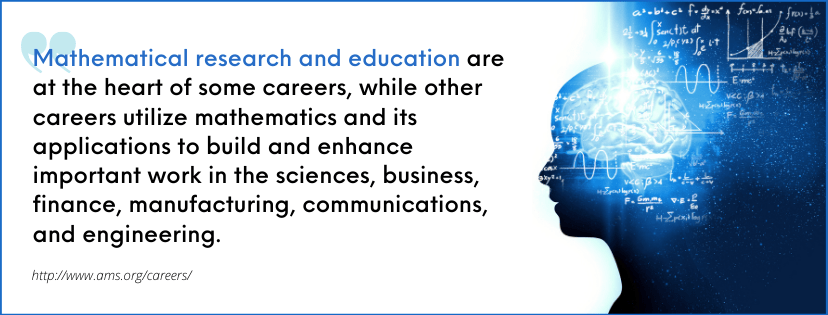
Can I earn my Master of Mathematics degree online?
With online master’s degree programs, the delivery method may be 100% online or a hybrid consisting of online classes and on-campus activities. There may also be a mix of synchronous and asynchronous schedules and digital technology like group and individual chats and emails and platforms like Blackboard, which allow students and instructors to interact. The coursework will likely be similar to on-campus programs, including proctored exams, quizzes, and presentations.
What are the prerequisites for a Master of Mathematics program?
The entry requirements differ, but the most common are:
- A Bachelor’s in Mathematics or a related field, or an equivalent qualification
- Official transcripts and certificates, when applicable
- A personal statement
- Graduate Record Examination (GRE) score (This is an optional requirement in some programs)
Online applications are the norm in online master’s degree programs. Many programs will also conduct an online interview to determine applicants who can be admitted as students.
Is accreditation important?
Accreditation is vital in choosing the master’s in mathematics programs in this list because it’s an effective tool in determining their academic quality. It’s also among the prerequisites for public and private donors when approving applications for students’ financial aid funding, with the premise being that accredited schools provide high-quality education.
What’s the best program for you – MA or MS?
Both programs usually take two years for completion and prepare their students for careers in teaching and industry and may require a thesis or capstone project. But some differences must be considered when choosing between these two programs.
For one thing, an MA degree has more non-mathematics courses because of its liberal arts orientation and, thus, many programs offer a teaching concentration. An MS degree has more advanced mathematics courses that require a strong math background. Both degrees, nonetheless, can lead to a Ph.D. degree if you pursue them.
For another thing, an MS program is far more rigorous than its MA counterpart because of the advanced courses. Its coursework is akin to the first two years of a doctoral program designed to pursue a university or college teaching position. MA graduates are more likely to teach at the K-12 level.
The bottom line: You must have a clear idea of what you’re planning to do with a master’s in mathematics degree. You will then be able to evaluate the pros and cons of an MA and MS program as it applies to your unique case.
What’s better for you – a thesis or non-thesis program?
Again, it depends on your unique personal and professional goals. On the one hand, a thesis program is an excellent choice for students planning to pursue a Ph.D. since admissions committees favor their research and communication abilities.
It’s also suitable for students whose interest lies in a research-heavy discipline or who want to be published authors in their field. Indeed, students who enroll in a thesis program will improve their writing skills and analytical and critical thinking skills!
On the other hand, a non-thesis program can be completed in less time since there’s no written product required. But remember that there will likely be another graduation requirement, such as a capstone project or a comprehensive exam.
Students with more interest in building projects instead of researching and writing, who like hands-on experiences, or who have more pressing responsibilities will find it more suitable for them, too.
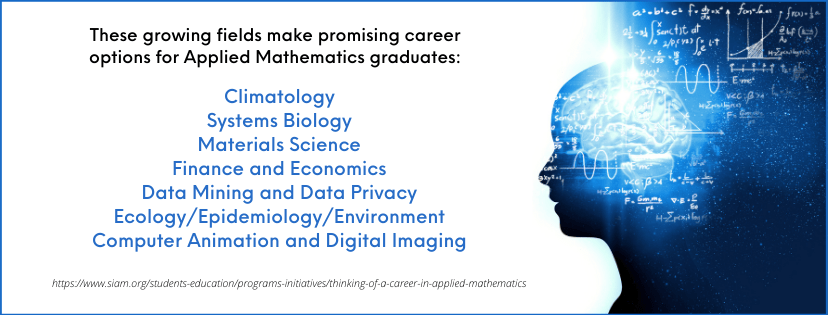
Can you enroll in a master’s in mathematics program without a math-related degree?
Yes, it’s possible, but you will likely be required to take prerequisite courses to get up to speed. You must also possess a high aptitude in math if you want to handle a math-heavy graduate program’s academic rigor.
What are the benefits of earning an online Master’s in Mathematics degree?
What’s not to love here?… Check out these advantages of earning a Master’s degree in Math:
- Improved career prospects: Holding a master’s degree in mathematics greatly enhances job opportunities for graduates, as employers prefer candidates with higher education qualifications.
- Advanced knowledge in mathematics: Earning a master’s in mathematics provides students with a deeper and more advanced understanding of mathematical concepts and their applications, thus broadening their knowledge base.
- Higher earning potential: Generally, those with graduate degrees earn more than those with a bachelor’s degree.
- Increased job security: As the business world places more emphasis on data and analytics, having a master’s degree in mathematics allows you to be more competitive and better equipped for the changing job market.
- Flexibility and convenience: Online master’s in mathematics programs provide students with more flexible scheduling options and the ability to access learning materials from anywhere with an Internet connection.
How will earning a Master’s degree in Mathematics advance my career in the field?
Having a Master’s degree in Mathematics can offer you a variety of career options, such as mathematicians, statisticians, or operations research analysts. As a master’s degree holder, you would be highly sought after to fill these positions. This degree also often leads to high-level math-related jobs such as finance, economics, computer science, engineering, or other business professions requiring a strong foundation in mathematics.
Ultimately, holding a Master’s degree in Mathematics can give you the qualifications to pursue a highly rewarding career.
Pursue your career as a Mathematician. Watch this exciting video:
Other helpful resources:












